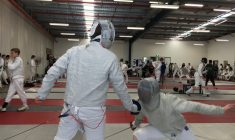Discipline – The Essential Ingredient
When parents are looking for a school, discipline is close to, or at the top of the list. A school with good order, rules that ensure learning is not disrupted, and students who are safe and cared for, is a given for many parents.
Most secondary age boys would also agree, even if they don’t admit to it to their friends, that a structured school with consistently applied standards of behaviour makes for a safe and secure environment that can be relied upon. Of course, boundaries will be tested and this is quite normal as boys wish to see how far these rules will be applied and thus contributes to their familiarity with their environment.
There has been a shift in the philosophy of discipline over the last few decades, especially in schools which are interested in growing character as well as the academic prowess of their students. There is a shift from controlling by rules with consequences and punishment towards a more ‘self-discipline’ approach where behaving respectfully ensures the environment remains ordered and safe. There is a strong argument for promoting ‘self-discipline’, as for many, self-regulation of behaviour is a character strength that keeps us safe, healthy and connected to family and friends in adult life.
Managing impulses, appetites and behaviour is an essential quality in good relationships. Young people, however, do not have the skills to regulate their own behaviour, and ensuring fellow students feel safe and learn in a respectful environment requires certain forms of discipline. Newington uses many forms of discipline to help the boys grow in character.
The first is ‘positive discipline’. This is based on praise and affirmation. Rewarding good, respectful behaviour both verbally and in the form of merits, reinforces what we would like to see more of in them.
‘Redirective’ or ‘gentle discipline’ steers the boys away from poor behaviour towards the good.
‘Boundary discipline’ is very common in schools and clear consequences for poor behaviour are sometimes required. Consequences act as a deterrent for poor behaviour as students tend to want to avoid consequences and as such behave in a certain way.
Preventing poor behaviour is better than having to correct it once it has occurred. Over my many years in schools, there does not seem to be a bullet-proof system that will suit every student all of the time.
At Newington however, much is made of the relationship between the staff and the students, especially the Mentors (House Tutor) and the student. Modelling good behaviour is essential, and being clear to boys about what is expected of them is essential. However, some ‘boundary-based’ discipline is essential at school as it is in the family home.
To simply hope that 1,360 boys will do the right thing all of the time is obviously wishful thinking. The adult analogy of road rules and laws is an example of how we can keep people safe on the road. We as adults need ‘boundary-based’ rules and ‘preventative’ methods to ensure we comply for the greater good and safety of all. The same is true in schools. Basic rules and punishment do keep us heading in the right direction and can prevent many minor, as well as major transgressions. Many teaching colleagues, however, do make the point that there has been a shift in parental support for schools.
Parents questioning the discipline policies of the school, especially when it is applied to one of their own children, seems to be more prevalent. As a parent myself, it is challenging to view some consequences as a positive in the long run, but it is essential. Defending poor or unsociable behaviour simply compounds the problem for the student and may lead to more serious issues in the future. Fortunately, Newington enjoys supportive parents most of the time, making consistent positive discipline easy to reinforce.
The consequences or punishments for ‘boundary discipline’ are not ideal some of the time. Detentions are the ‘fast food’ solution to minor infractions. However, the reflection statements taken from the students during detention do encourage them to plan future behaviour differently.
In conclusion, discipline is for the benefit of all in a community where self-discipline is lacking and consequences applied. The aim is to create a safe, respectful and enjoyable community where students feel safe and protected. As our boys grow into men of substance, it is hoped that the ‘boundary discipline’ consequences will no longer be required as self-regulation and responsibility take over.
Mr Robert Meakin
Deputy Head of Stanmore – Students
















































































































